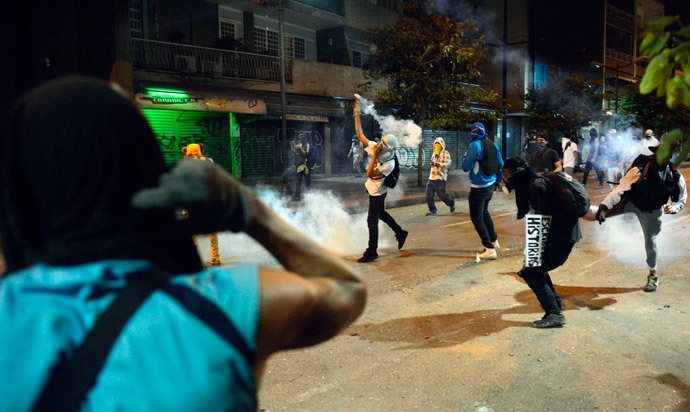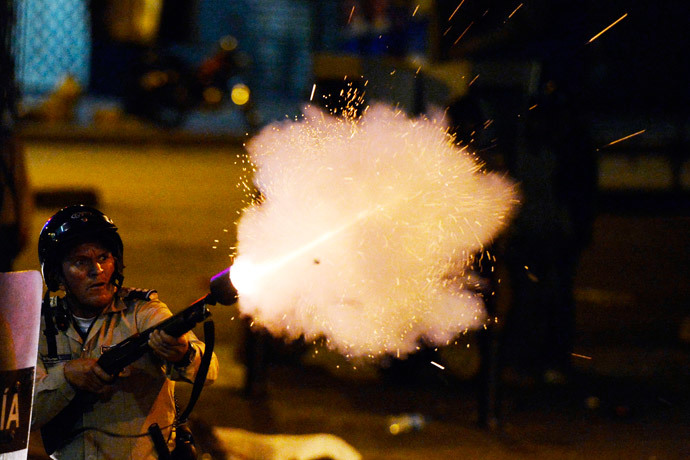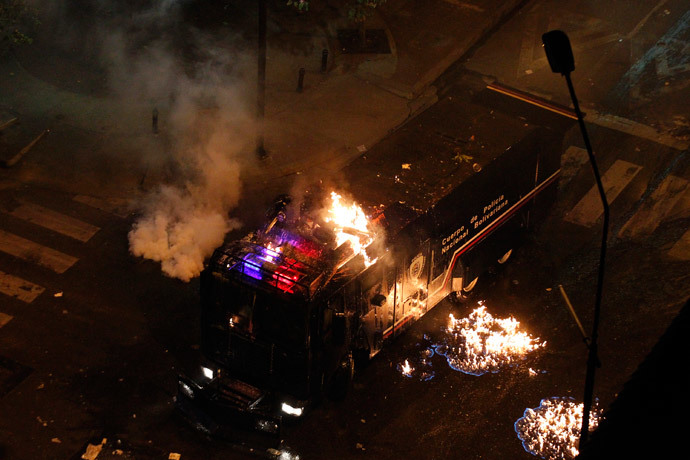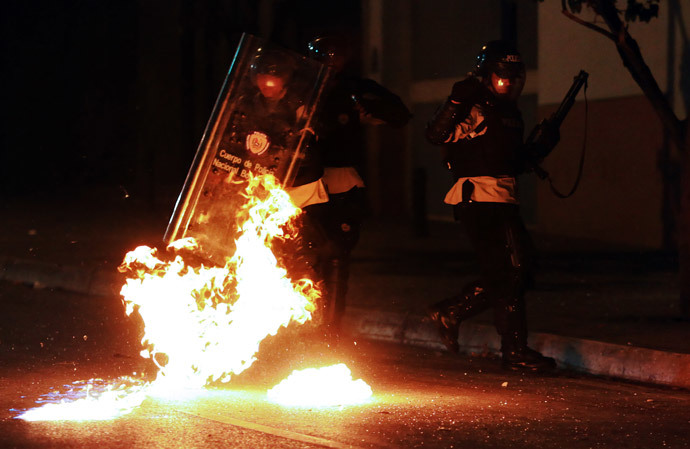Thursday, April 03, 2014 11:59 PM
From Mish.......
Venezuela Decrees "All Properties Leased for 20 Years Will Be Sold to Tenants in 60 Days at Government Set Prices"
Venezuelan president Nicolas Maduro proves once again the capacity for stupidity is virtually unlimited.
Today Maduro mandated that any properties leased for 20 years or longer will be sold to current tenants at government mandated prices, essentially confiscating all long-term rental properties.
Via translation from Libre Mercado, please consider Venezuela Expropriates Properties Leased More Than 20 Years.
Today Maduro mandated that any properties leased for 20 years or longer will be sold to current tenants at government mandated prices, essentially confiscating all long-term rental properties.
Via translation from Libre Mercado, please consider Venezuela Expropriates Properties Leased More Than 20 Years.
Nicolas Maduro, president of the Republic of Venezuela decreed on Monday that properties leased for 20 years, will be sold to their tenants in a maximum period of 60 days. The National Superintendent of Housing says the lease countdown began on March 28.Wow. What's next?
In the event that the property owners refuse to sell their property, the Superintendent of Housing will impose a fine of 29,000 euros, which must be paid within five days. If the penalty is not paid in 5 days, the fine will more than double to 60,000 euros.
Property owners are totally defenseless, as buyers may propose bargain prices. Nonetheless, owners shall comply with the "fair value of the dwelling" determined by the government via a form which shall provide, among other things, photographs of both the housing and the façade.
Once completed, the owner must wait for the government determined "right price" estimated by the superintendent for housing.
http://www.centredaily.com/2014/04/01/4113562/venezuela-issues-id-cards-to-curtail.html
Venezuela issues ID cards to curtail food
hoarding
CARACAS, VENEZUELA — Battling food shortages, the government is rolling out a new ID system that is either a grocery loyalty card with extra muscle or the most dramatic step yet toward rationing in Venezuela, depending on who is describing it.
President Nicolas Maduro's administration says the cards to track families' purchases will foil people who stock up on groceries at subsidized prices and then illegally resell them for several times the amount. Critics say it's another sign the oil-rich Venezuelan economy is headed toward Cuba-style dysfunction.
Registration began Tuesday at more than 100 government-run supermarkets across the country. Working-class shoppers who sometimes endure hours-long lines at government-run stores to buy groceries at steeply reduced prices are welcoming the plan.
"The rich people have things all hoarded away, and they pull the strings," said Juan Rodriguez, who waited two hours to enter the government-run Abastos Bicentenario supermarket near downtown Caracas on Monday, and then waited another three hours to check out.
Rigid currency controls and a shortage of U.S. dollars make it increasingly difficult for Venezuelans to find imported basic products like milk, flour, toilet paper and cooking oil. Price controls don't help either, with producers complaining that some goods are priced too low to make a profit and justify production.
As of January, more than a quarter of basic staples were out of stock in Venezuelan stores, according to the central bank's scarcity index. The shortages are among the problems cited by Maduro's opponents who have been staging protests since mid-February.
Checkout workers at Abastos Bicentenario were taking down customers' cellphone numbers Monday, to ensure they couldn't return for eight days. Shoppers said employees also banned purchases by minors, to stop parents from using their children to engage in hoarding, which the government calls "nervous buying."
Rodriguez supports both measures.
"People who go shopping every day hurt us all," he said, drawing approving nods from the friends he made over the course of his afternoon slowly snaking through the aisles with his oversized cart.
Reflecting Maduro's increasingly militarized discourse against opponents he accuses of waging "economic war," the government is calling the new program the "system of secure supply."
Patrons will register with their fingerprints, and the new ID card will be linked to a computer system that monitors purchases. On Tuesday, Food Minister Felix Osorio said the process was off to a smooth start. He says the system will sound an alarm when it detects suspicious purchasing patterns, barring people from buying the same goods every day. But he also says the cards will be voluntary, with incentives like discounts and entry into raffles for homes and cars.
Expressionless men with rifles patrolled the warehouse-size supermarket Monday as shoppers hurried by, focusing on grabbing meat and pantry items before they were gone. Long shelves that should have been heaped with rice and coffee instead displayed six brands of ketchup. There was plenty of frozen beef selling for 22.64 bolivars a kilogram — $3.59 at the official exchange rate, or 32 cents at the black market rate increasingly used in pricing goods.
A local consumer watchdog, the National User and Consumer Alliance, invokes the specter of Cuba's struggling economy and calls the ID program rationing by another name. It predicts all Venezuelans without cards will soon be barred from shopping at state supermarkets.
After five decades of rationing basic goods for Cubans, President Raul Castro's communist government is phasing out subsidized foodstuffs as it opens the island's economy to private enterprise. Cubans most dependent on the rationed goods say that in recent years their monthly quotas provided only enough food for a couple of weeks.
Until now, Venezuela's restrictions on purchases have been toughest in its cities on the border with Colombia. Venezuelans can make a killing by buying goods at below-market prices and smuggling them into Colombia for sale at much higher prices.
Defenders of Venezuela's socialist government say price controls imposed by the late President Hugo Chavez help poor people lead more dignified lives, and the United Nations has recognized Venezuela's success in eradicating hunger.
Complaints aren't heard in the long lines at government supermarkets. One young mother shielded her eyes against the afternoon sun as she approached a cashier with sugar, flour and Frosted Flakes cereal. She arrived at 10 a.m., but didn't blame the government or its opponents for the long wait.
"I don't know if it's worth it, but when my children are crying what else can you do," said the woman, who declined to provide her name as an armed National Guardsmen watched her at the checkout line.
She planned another five-hour run to another supermarket Tuesday to get everything out of stock at the downtown store.
http://www.usatoday.com/story/news/world/2014/04/01/venezuela-opposition-lawmaker/7185043/
Maria Corina Machado vowed to continue fight for resignation of President Nicolas Maduro.
CARACAS, Venezuela (AP) — A leader of Venezuela's opposition was barred from entering the National Assembly on Tuesday after hundreds of supporters rallied to protest her recent ouster from the legislature.
Maria Corina Machado promised supporters she would keep fighting for the resignation of President Nicolas Maduro, then mounted a motorcycle and headed off to the National Assembly, her eyes running from tear gas police fired to keep the crowd from following her.
When Machado encountered more riot police standing outside the congressional palace, she quickly jumped back on the motorcycle and sped away.
Some of those who had rallied behind her stayed in the streets, and as night fell, the protests turned violent. Flames billowed out of the windows of the Ministry of Housing as young people threw rocks at police and ran from an armored truck with high-pressure water hoses they call "the whale."
Speaking in Caracas, Maduro called the protesters who have been building barricades and taking over plazas for seven weeks "infantile terrorists."
In the buildup to Tuesday's protest, many wondered if Machado's return to the legislative building would end in her arrest.
The wealthy, well-traveled conservative has been a key figure leading the opposition. The other high-profile anti-government leader, Leopoldo Lopez, has been imprisoned since Feb. 18. A sea of protesters accompanied him when he turned himself in on charges of provoking the unrest.
Lawmakers from Maduro's socialist party stripped Machado of her seat last week after she denounced alleged human rights abuses by her government at a meeting of the Organization of American States in Washington. Venezuela's high court on Monday backed her ouster.
On Tuesday, Machado told the crowd that the Maduro administration had committed an unprecedented crime against the sovereignty of the people.
"Not only have they destroyed democracy in Venezuela, they're dismantled the republic," she said.
Her supporters, wearing white T-shirts and hats in the bold primary colors of the Venezuelan flag, chanted "courageous!" when Machado said she would return to the National Assembly and defend her mandate. As the crowd began marching with her, riot police stopped them with tear gas canisters.
When Machado got to the congressional building, she encountered mostly pro-government protesters, some of whom shoved her.
Machado, 46, is a leader who government loyalists love to hate. An engineer by training, she was photographed in 2005 shaking hands with U.S. President George W. Bush in the Oval Office, an image still shown whenever she is chastised on state television. But her worst offense, in the government's eyes, was her co-founding of a group that supported an unsuccessful referendum to recall Hugo Chavez, Maduro's fiery, beloved predecessor.
To her supporters, she is a sophisticated and fearless spokeswoman for those who blame Venezuela's economic struggles and high crime on the socialist government.
On Tuesday, the human rights group Amnesty International warned that government security forces may be committing abuses against protesters. The Maduro administration says it is investigating several reports of cruel treatment.
Protesters at Machado's rally held signs alleging police brutality, another complaint that has added to protesters' outrage over high inflation, violent crime and chronic food shortages.
http://rt.com/news/venezuela-clashes-deaths-39-505/
The death toll of the violent protests that have shaken Venezuela for the last month and a half has reached 39. To avoid “civil war”, the country’s Foreign Minister Elias Jaua has called for dialogue with the opposition.
Clashes erupted once again in the Venezuelan capital on Monday night, as hooded activists erected barricades on the streets of Caracas, causing massive disruption. Protesters smashed shop windows and set fire to cars before the riot police arrived and dispersed them using tear gas and water cannons.
Elsewhere in the west of Venezuela violence was reported in the cities of Maracaibo and San Cristobal, killing two people and bringing the total death toll in Venezuela to 39. One protester was electrocuted in San Cristobal while trying to reinforce a barricade, and another died in Maracaibo when a homemade explosive device detonated in his hands before he could throw it at police.
Protests have been held throughout Venezuela for the past month and a half, with the population frustrated over inflation, mass power cuts and a lack of basic goods. The Venezuelan government claims that the largely peaceful protest movement has been hijacked by extremist, right-wing, political elements backed by the US, whose aim is to ouster President Nicolas Maduro.
On Monday, the Venezuelan Foreign Minister Elias Jaua called for dialogue with the opposition to avoid the threat of civil war. He told the private channel, Globovision, that there was an element of the opposition loyal to the United States that is pushing for an armed conflict.
“The president has said: ‘let’s negotiate without conditions, without preconceived agendas to stop this irrational violence that has killed almost 40 men and women,’” said Jaua, adding the Venezuelan government is waiting for a gesture of goodwill from the opposition.
The US has denied any involvement in the mass protests in Venezuela and has accused Maduro’s government of using Washington as a scapegoat. Last week US Assistant Secretary of State Roberta Jacobson said that the US had not ruled out the possibility of imposing sanctions on the Latin American country. She said financial penalties could become an “important tool” in pressuring Maduro into negotiations with the opposition.
In response, the Venezuelan government accused Washington of meddling in Venezuelan affairs and “ignoring the democratic process.”
Venezuela’s Latin American neighbors have also rallied in support of Maduro’s government. Uruguayan President Jose Mujica told the press on Monday that the US should respect Venezuela and let it find its own way out of the current crisis.
"The first thing that Venezuela and all of Latin America needs is to be respected,” said Mujica.“When the whole world urges the US to rescind its embargo policy on Cuba, voices in Washington threaten sanctions on Venezuela. Have they learnt nothing from history?”




No comments:
Post a Comment